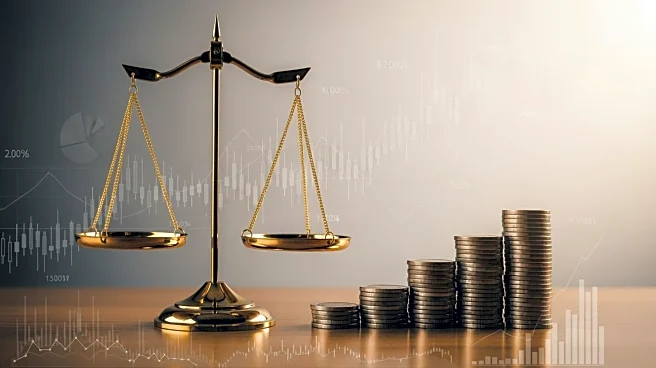What's Happening?
Inflation, the rate at which prices for goods and services increase, is currently a significant concern in the U.S. economy. It affects various sectors, including housing, food, medical care, and utilities,
as well as discretionary items like cosmetics and automobiles. Inflation can be driven by increased production costs, higher consumer demand, and fiscal and monetary policies. The Federal Reserve closely monitors inflation to prevent it from rising too rapidly, which can push basic necessities out of reach for consumers. Inflation erodes purchasing power and can devalue currency, impacting savings and investments. Companies may benefit from inflation if they can charge more for their products due to high demand.
Why It's Important?
Inflation has broad implications for the U.S. economy, affecting consumer behavior, corporate spending, and government policy. High inflation can lead to increased prices for groceries, energy, and fuel, impacting household budgets and reducing disposable income. It can also affect investment returns, as inflation erodes the real value of earnings. Businesses may face higher production costs, which can be passed on to consumers, further driving inflation. The Federal Reserve aims to maintain price stability, targeting inflation between 2 and 3 percent annually. Understanding inflation is crucial for making informed financial decisions and managing economic stability.
What's Next?
The Federal Reserve may consider adjusting interest rates to control inflation. Raising rates can reduce consumer spending and business investment, easing inflationary pressures. Fiscal measures, such as tax adjustments, can also influence demand and mitigate inflation risks. Monitoring inflation indexes and understanding its behavior in key sectors will help stakeholders plan major purchases and protect finances. The Federal Reserve's actions and economic indicators will be closely watched for signs of potential recession or market instability.
Beyond the Headlines
Inflation can have long-term effects on economic growth and consumer confidence. It may discourage saving and investment, essential drivers of sustained economic growth. High inflation can undermine confidence in the national currency, leading consumers to seek alternatives like commodities or foreign currencies. Understanding the causes and effects of inflation helps make better financial decisions to protect money and investments during inflationary periods.









